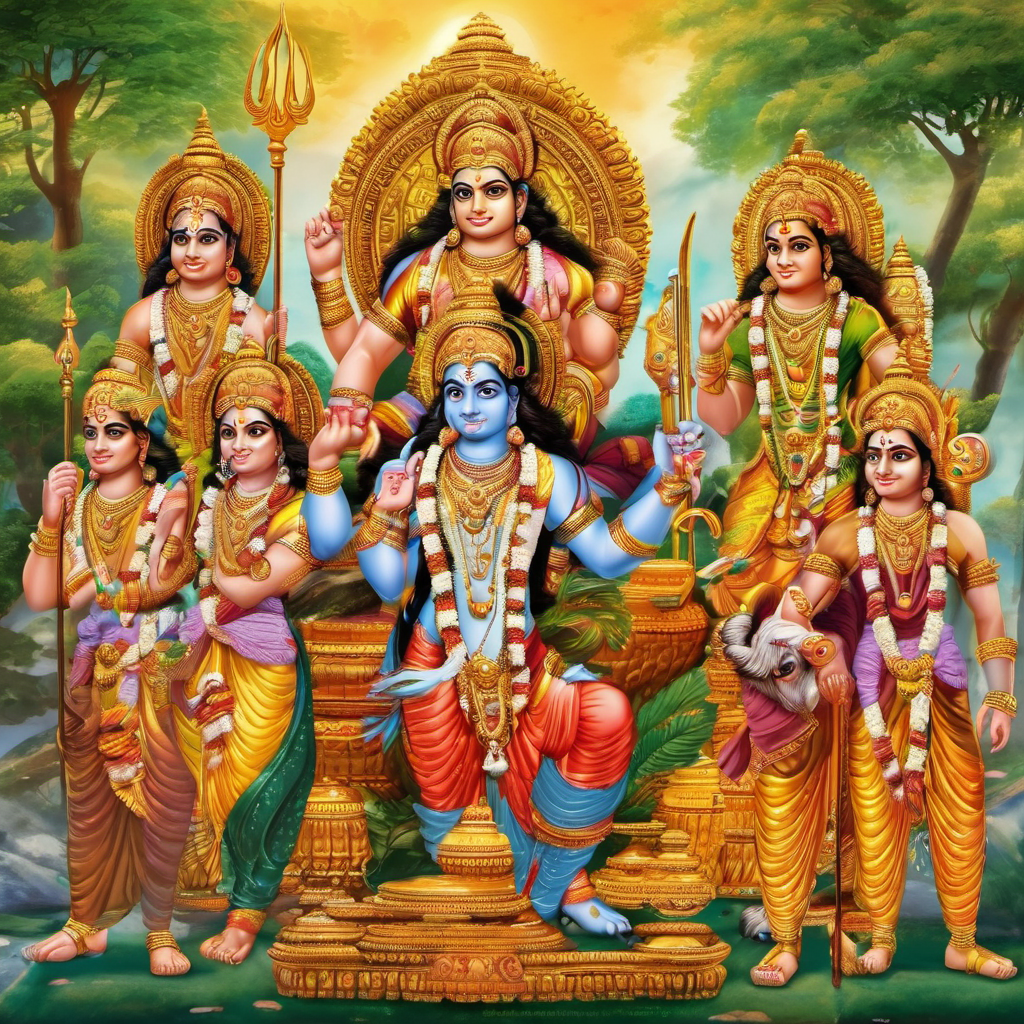“Welcome to our blog post of ‘Yudhishthira’s Wisdom.’ In this article, we delve into the profound teachings and rational decisions made by Yudhishthira, a central figure in the ancient Indian epic, Mahabharata. Join us as we unravel the layers of wisdom demonstrated by Yudhishthira, providing a comprehensive understanding of his thoughtful choices and the valuable lessons they hold. Whether you’re a fan of epics, a student of philosophical narratives, or simply intrigued by the wisdom of historical figures, this journey aims to make the depth of Yudhishthira’s insights accessible to all, fostering a meaningful appreciation for the enduring wisdom embedded in his character.”
Read More: Four Levels of King David’s Crime
Literal Comprehension:
In the great Hindu epic, “The Mahabharat,” there’s a tale about Yudhisthira and his wisdom. Once, during their forest life, the Pandavas were desperately thirsty while chasing a deer. Yudhisthira sent his brothers to find water, but they didn’t return. Concerned, he went to search and found a beautiful spot with a pool, but sadly, his brothers lay lifeless there.
A mysterious being, Yaksha, claimed ownership of the pool and set a condition – Yudhisthira could use the water only if he answered questions. Despite the grief, Yudhisthira calmly responded: “God’s power brightens the Sun; Courage conquers danger; A mother’s love surpasses Earth’s gifts; Humility brings love; Happiness follows anger’s release; Renouncing desire brings instant riches.”
Impressed, Yaksha revealed himself as Yama and praised Yudhisthira. As a reward, Yama revived the Pandava brothers and advised them to live in Matsya.
Interpretation of Yudhisthira’s wisdom:
While easy to understand, this story holds valuable moral lessons and deep philosophical insights. It emphasizes the importance of patience and wisdom, showcasing how these qualities lead to positive outcomes. Instead of roadblocks, obstacles become stepping stones to victory when approached with wisdom and justice. The narrative highlights that an angry person seldom finds true happiness.
Simultaneously, the story underscores the magnificence of righteousness and godliness. Individuals who embody principles of justice and wisdom receive honor not only in death but also while they are alive. It beautifully illustrates that a life guided by morality and virtue is revered throughout.

Critical Thinking of yudhisthira’s wisdom:
While the story holds philosophical depth, its trustworthiness may be questioned in the eyes of a modern reader. Contemporary beliefs often challenge the existence of gods who control natural phenomena, such as making the sunshine.
The simplicity of the narrative doesn’t align with the complexities of life. Wisdom and patience may not always be universally praised. Not all wise individuals are honored, and courage alone might not be the ultimate defense against danger. The deaths of the brothers over seemingly straightforward questions from Yaksha raise doubts about the story’s coherence.
The idea that giving up pride or desires leads to love or riches is also questionable. Examples like Gandhi, who renounced pride, don’t universally validate this claim. Additionally, scrutinizing “Yudhisthira’s wisdom” as an extract rather than judging the entire epic might be essential, as context is crucial for a comprehensive understanding. Critically examining the entire text is necessary for a fair judgment.
Read More: Four Levels of Piano | Perfect -explanation
Assimilation of Yudhisthira’s Wisdom:
This story has profoundly influenced my life philosophy. Previously, material success held utmost importance for me, but Yudhisthira’s wisdom has brought a transformative shift. I’ve come to understand that material prosperity isn’t the essence of life. Instead, patience, righteousness, wisdom, and justice are crucial.
The narrative has taught me that happiness is constructed on the foundations of love, care, and sympathy. The true weapons for a successful life are right conduct and wisdom. Individuals embodying these virtues receive respect while alive and are honored even in death. It’s a valuable lesson that has guided me towards a more fulfilling and meaningful life.

The theme of Yudhisthira’s Wisdom:
The statement underscores the primary themes of Yudhisthira’s story, emphasizing righteousness, wisdom, patience, and devotion to God. Yudhisthira’s character serves as a focal point, highlighting the significance of these attributes in the narrative. The story underscores the essential role these qualities play in defining greatness, emphasizing the moral and ethical principles they represent.
Moral of Yudhisthira’s Wisdom:
It’s a moral story that imparts lessons about the significance of wisdom, justice, morality, patience, courage, and good conduct in life.
Summary:
The Mahabharata, a renowned Hindu mythology, served as the muse for this narrative. It unfolds as a moral fable, imparting lessons on the value of knowledge, fairness, morality, patience, bravery, and virtuous living.
On a day of deer hunting, Yudhishthira, accompanied by his four brothers (the Pandavas), finds himself in a parched and weary state. Sending his brothers in search of water, they never return. Distressed, Yudhishthira embarks on a quest for his missing siblings, discovering a picturesque pool along the way. To his dismay, he finds his brothers lying lifeless by the water. Before quenching his thirst, a voice warns Yudhishthira against drinking until he answers a series of philosophical questions posed by the enigmatic Yaksha.
Having humbly submitted to Yaksha’s inquiries, Yudhishthira earns the right to drink. He wisely chooses not to save his brothers based on personal bias but makes a moral decision. Despite the voice’s warning, all brothers, except Yudhishthira, had consumed the water and fallen unconscious due to Yaksha’s curse.
Yudhishthira’s moral stance leads him to plead for Nakula’s life, his stepmother’s sole son, selflessly prioritizing others over himself. In return for his wisdom, Yaksha, revealing himself as Yama, guides their journey and promises protection from future challenges. This tale underscores the importance of wisdom, patience, courage, honesty, fairness, and morality in navigating life’s complexities and achieving success.
yudhisthira’s Wisdom Summary in Nepali
महाभारत, एक प्रसिद्ध हिन्दू पौराणिक कथा, लोपोको मुल राखिएको छ यो कथा लागि। यो एक नैतिक कथा हो, जुन हामीलाई ज्ञान, न्याय, नैतिकता, धैर्य, शौर्य, र राम्रो जीवनको मूल्य सिकाउँछ।
पाण्डवहरू जंगलमा आफ्नो जीवन बिताउँदै गरेका थिए, एकपटक तिनीहरूले हरियो झारी शिकार गर्न लगे। तिनीहरूले भाग्यशालीपनामा हेरे भने, तिनीहरूले यो हिरणलाई पछाडी जान लगेका थिए। यो झारी धेरै चले, तिनीहरूले यो कहिल्यै पनि खोज्दैन। भाइहरू थकेपछि प्यासा भएका थिए। त्यसकारण, तिनीहरू एक रुख तल बसे। युधिष्ठिर एक रुख तल विश्राम गर्न लागेका थिए र पानीको खोजमा सहदेवलाई पठाए। तर लामो समयसम्म उहाँ फर्किएन। त्यसैले उहाँले नकुललाई भएको कुरा हेर्न लगे। तर सहदेव, उहाँ पनि फर्किएन। युधिष्ठिरले बाँकी भाइहरूलाई पठाए, तर कसै पनि फर्किएन। युधिष्ठिरले उनीहरूको अशुभ भविष्यको बारेमा थाहा पाइन्न। तसर्थ, उहाँले उनीहरूकी पछि हेर्ने निर्णय गरेका थिए।
उनले कहिल्यै दूरबाट एउटा सुन्दर दृश्य हेरेका थिए। तत्त्वीय र स्वच्छ पानी थियो जहाँ नीलो आकाश प्रतिफलित हुँदै छिराइरहेको थियो। त्याहाँ सोने रंगका फूलहरू पनि खिरेका थिए। तर उहाँले अरू पनि दृश्य हेरेका थिए, जसमा उहाँको रक्त शीतल हुँदैछ। उहाँले देखेका थिए कि यस्तै ठाउँमा उनका चार भाइहरू मृत वा अज्ञानमा लेटेका छन्। युधिष्ठिर चाहिन्छ थिए कि उनीहरू बिना आफ्ना भाइहरूकै साथ कसै पनि रहिन सक्छ। उनीहरूको मुखमा हेर्दा, उहाँ खुब रुन लागेका छन्। युधिष्ठिरले थाहा पाइन्छ कि उनीहरू त्यसका कारण मारिएका थिए किनकि उनीहरूले यक्षको आदेश पालन गरेनन्। पूल यक्षको थियो र यसमा कसैले आफ्नो प्रश्नमा उत्तर दिनु अघि कसै पनि पानी पिउनु हुँदैन।
त्यसका प्रश्नहरूमा उनीहरूको उत्तर थिए “देवताको शक्ति सूर्यलाई चम्काउँछ; खतरामा बन्दै दृढ बच्चा हुँदछ; आमाले मानिसलाई पृथ्वीभन्दा बढी दिन्छ; जब मानिस अपमान छोड्छ, तब उहाँले आफ्नै लोगहरूबाट माया पाउँछ; जब मानिस क्रोध ग
- 10 Best Essential Business Management Techniques You Need to Know
- Maximize Efficiency and Growth: Expert Product and Service Management Solutions
- Why Macroeconomics is the study of the economy as a whole – Best Info
- Understanding Supply and Demand: A Comprehensive Explanation
- The Nature and Scope of Macroeconomics- A Best Guide
FAQ
Describe “Yudhisthira’s Wisdom” from Yaksha’s perspective.
From Yaksha’s perspective, “Yudhisthira’s Wisdom” portrays a profound display of insight and virtue. Yudhisthira, faced with the tragic sight of his brothers lying lifeless by a beautiful pool, responds to Yaksha’s challenging questions with simplicity and depth. Yaksha, who is later revealed to be Yama, the god of death, is impressed by Yudhisthira’s answers.
The narrative showcases Yudhisthira’s understanding of fundamental truths: the power of God, the role of courage in facing danger, the incomparable love of a mother, the virtues of humility and the abandonment of pride and anger, and the richness that comes from giving up desires. Yaksha recognizes Yudhisthira’s wisdom, righteous conduct, and moral values, ultimately rewarding him by reviving his deceased brothers.
In Yaksha’s eyes, Yudhisthira exemplifies a rare combination of philosophical depth and moral rectitude, earning admiration for his responses and, consequently, the restoration of life to his brothers.
In Yudhishthira’s perspective, retell the tale “Yudhisthira’s Wisdom”?
From Yudhisthira’s perspective, the tale of “Yudhisthira’s Wisdom” unfolds with a blend of challenge, grief, and moral strength. Thirsty in the forest, the Pandavas face a tragic situation when his brothers fail to return after searching for water. Yudhisthira, worried, discovers a picturesque pool where his brothers lie lifeless.
Yaksha, the guardian of the pool, presents conditions for using the water: answering challenging questions. Yudhisthira, despite the sorrow of his brother’s demise, responds with profound simplicity. He emphasizes the power of God, the importance of courage in facing danger, a mother’s unparalleled love, the virtues of humility, the significance of abandoning pride and anger, and the richness gained by giving up desires.
In Yudhisthira’s narrative, the encounter with Yaksha serves as a test of moral character and wisdom. His sincere and wise responses not only impress Yaksha but also lead to the revelation that Yaksha is Yama, the god of death. Yama commends Yudhisthira for his virtues, reviving his brothers and advising them to live in Matsya.
For Yudhisthira, the tale becomes a lesson in moral fortitude, showcasing that wisdom, righteousness, and humility can triumph even in the face of adversity. The restoration of his brothers and Yama’s praise affirm the enduring value of such virtues in the journey of life.
Retell the plot of this story “Yudhishthira’s Wisdom”.
The story unfolds during the Pandavas’ exile in the forest. Thirsty and tired, they chase a deer, leading them to a picturesque pool. Yudhishthira, concerned when his brothers fail to return after searching for water, discovers them lifeless by the pool.
Yaksha, the guardian of the pool, reveals himself and sets a condition: Yudhishthira must answer challenging questions to use the water. Despite the heartbreaking scene, Yudhishthira responds with profound simplicity. His answers touch on the power of God, the role of courage in facing danger, a mother’s boundless love, the virtues of humility, and the importance of abandoning pride, anger, and desire.
Impressed, Yaksha, who is later revealed as Yama, the god of death, commends Yudhishthira’s wisdom and righteousness. As a reward, Yama revives the Pandava brothers and advises them to live in Matsya.
The plot revolves around Yudhishthira’s encounter with challenges, where his moral strength, wisdom, and humility triumph. The story teaches profound life lessons about the value of virtue, righteousness, and the enduring nature of wisdom even in the face of adversity.
Give a summary of “Yudhishthira’s Wisdom” in one sentence.
Patience, obedience, wisdom, and justice are qualities of a true warrior, such as Yudhishthira, who survived the Yaksha testing because he maintained his bravery and patience under pressure.

